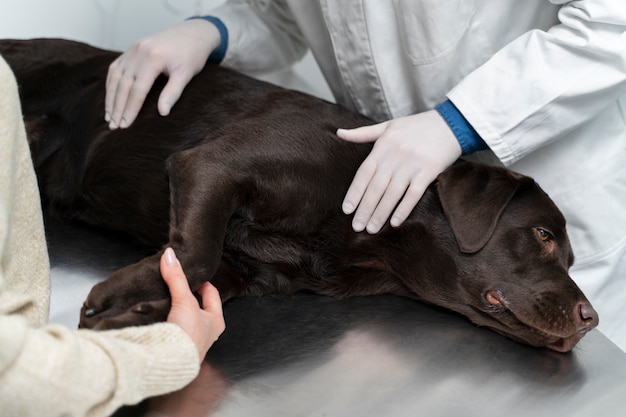What to Expect from Pet Soft Tissue Surgery at Pets4Life

What to Expect from Pet Soft Tissue Surgery at Pets4Life
When your pet needs surgery, it is completely normal to feel anxious and uncertain. Whether your veterinarian has recommended a routine procedure or your pet requires urgent care, understanding exactly what to expect can ease your worries and help you make the best decisions for your companion. At Pets4Life, located in the heart of 661 Central Avenue, Highland Park, IL 60035, our veterinary team is dedicated to providing comprehensive, compassionate care throughout every step of your pet’s journey—from diagnosis to recovery.
In this guide, you will learn what pet soft tissue surgery involves, why it may be necessary, how our team prepares your pet for a safe procedure, and what postoperative pet care you can expect. We will also discuss how to recognize when your pet might need surgical intervention and the essential steps you can take to support their healing at home. If you are searching for a "vet near me" that delivers trusted pet soft tissue surgery in Highland Park, Pets4Life is here to help every step of the way. To further support you, we encourage you to explore our Pet Soft Tissue Surgery page for additional details about these services.
Recognizing When Your Pet May Need Soft Tissue Surgery
As a pet owner, being able to identify when your pet might benefit from soft tissue surgery is the first step toward ensuring their wellbeing. While some conditions requiring surgery are obvious, such as visible lumps or traumatic injuries, others can be more subtle and develop over time. Key signs that your pet may need surgical attention include persistent or rapidly growing lumps, wounds that do not heal, recurring infections, or sudden changes in appetite and energy. Additionally, difficulty urinating, abnormal bleeding, unexplained pain, or swelling around the abdomen or limbs may signal that something more serious is going on. Pets who are experiencing these symptoms should be evaluated by a veterinarian as soon as possible to determine if pet soft tissue surgery in Highland Park is the best course of action.
It is also important to note that some procedures, such as removing benign growths or repairing certain hernias, can be planned in advance. However, injuries like deep lacerations or abscesses may require urgent surgical intervention to prevent further complications. If you notice anything unusual about your pet’s health, seeking advice from a "quality veterinary services near me" can make all the difference in their outcome.
Understanding the Causes and Conditions Requiring Pet Soft Tissue Surgery
When we talk about pet soft tissue surgery, we are referring to procedures that address problems involving the skin, muscles, organs, or connective tissues rather than bones or joints. Common reasons pets in Highland Park and surrounding communities might require these surgeries include mass removals (such as tumors or cysts), wound repairs, hernia repairs, removal of foreign objects, and treatment for abscesses or infected tissues. Chronic ear conditions, bladder stones, and some types of gastrointestinal obstructions also often require surgical intervention.
Underlying causes leading to the need for surgery can range from genetic predispositions and age-related changes to accidents or injuries. For example, dogs who love to explore the outdoors may be more prone to wounds or abscesses, while older cats are more likely to develop certain types of growths. Environmental factors—such as exposure to ticks, sharp objects, or toxins—can also play a significant role. Recognizing these risks and maintaining regular veterinary checkups, such as a wellness examination, can help catch problems early and minimize the need for major surgical interventions.
If your pet has been diagnosed with a condition that may require surgery, rest assured that our veterinary team will work closely with you to explain all available options and answer any questions you have about pet soft tissue surgery in Highland Park.
What to Expect Before, During, and After Pet Soft Tissue Surgery
Pre-Surgical Evaluation and Preparation
Preparing for your pet’s surgery begins with a comprehensive health assessment. Our veterinarians conduct a thorough physical examination, review your pet’s medical history, and recommend pre-anesthetic testing, such as bloodwork and diagnostic imaging. These steps help us identify any underlying health concerns that could impact anesthesia or recovery. For some procedures, advanced diagnostics like digital radiology or ultrasounds may be utilized to precisely locate growths or assess internal organs.
Before surgery, you will receive instructions about withholding food and water to reduce anesthesia risks. Our team will answer any questions about what to expect and provide support to help you and your pet feel comfortable.
The Surgical Procedure
On the day of the procedure, your pet will be monitored closely from the moment they arrive. Anesthesia protocols are tailored to each pet’s needs, and advanced monitoring equipment is used throughout the process to track vital signs. During surgery, our veterinarians use sterile techniques to minimize infection risk and ensure the best possible outcome for your pet.
Depending on the type and complexity of the surgery, most soft tissue procedures can be completed within a few hours. Our team will update you on your pet’s progress and let you know when they are ready to go home.
Postoperative Pet Care and Recovery
Caring for your pet after surgery is just as important as the procedure itself. Immediately following surgery, your pet will be monitored as they wake from anesthesia and receive pain management tailored to their needs. Our team will provide detailed postoperative pet care instructions that include managing the incision site, administering medications, and recognizing signs of potential complications.
Common postoperative recommendations include keeping your pet calm and limiting activity, preventing them from licking or chewing the incision, and monitoring for swelling, redness, or discharge. If your pet has trouble eating, seems unusually lethargic, or exhibits signs of pain, you should contact our team for guidance. For many procedures, a follow-up visit will be scheduled to assess healing and remove sutures if needed.
Supporting your pet’s recovery also means creating a quiet, comfortable space at home and offering plenty of reassurance. Our veterinary professionals are always available to answer questions about postoperative pet care in Highland Park and to provide additional resources for a smooth recovery.
Prevention and Home Care: Supporting Your Pet’s Health Before and After Surgery
While not all surgical conditions are preventable, there are important steps you can take to support your pet’s wellbeing and reduce the risk of future problems. Scheduling routine wellness exams allows our veterinarians to monitor your pet’s health, detect changes early, and address potential concerns before they become more serious. Maintaining a healthy weight, ensuring proper nutrition, and providing regular exercise all contribute to your pet’s overall resilience and ability to heal.
After surgery, following your veterinarian’s home care instructions is essential. This includes keeping incision sites clean and dry, administering all prescribed medications, and ensuring your pet wears an Elizabethan collar if recommended. Monitoring your pet’s appetite, activity level, and bathroom habits provides valuable information about their recovery.
If you ever have questions about wound care, pain management, or dietary needs after surgery, please reach out to our veterinary team. We are committed to supporting your pet’s healing journey and providing the best possible postoperative pet care in Highland Park.
When to Seek Professional Veterinary Care
Knowing when to seek veterinary care is critical—both before and after your pet’s surgery. If you notice symptoms such as persistent vomiting, severe lethargy, difficulty breathing, or changes in urination or defecation, these may indicate serious complications that require immediate attention. Signs of infection at the surgical site, including excessive swelling, discharge, foul odor, or heat, should also prompt a call to your veterinarian.
If you are ever unsure whether your pet’s symptoms are urgent, it’s always better to err on the side of caution. Our veterinary professionals at Pets4Life are available to answer your questions, schedule timely appointments, and provide reassurance. You can count on our expertise for pet soft tissue surgery in Highland Park whenever your companion needs us.
Your Partner for Pet Soft Tissue Surgery in Highland Park
At Pets4Life, we understand that your pet is a beloved family member, and we are honored to be part of their care team. From the initial consultation to postoperative pet care, our veterinarians are dedicated to providing personalized, compassionate service that puts your pet’s comfort and safety first. If you are searching for the "best vet team near me" or need support with pet soft tissue surgery in Highland Park, our doors are always open.
We invite you to schedule an appointment by calling (847) 434-2745 or visiting our hospital at 661 Central Avenue, Highland Park, IL 60035. For more information about our comprehensive veterinary services, explore our full service offerings or learn more about specialized Pet Soft Tissue Surgery provided right here in Highland Park. Your pet’s health and happiness are our highest priority, and we look forward to partnering with you for many healthy years to come.
This article is intended for informational purposes only and does not substitute for professional veterinary advice. Always consult your veterinarian for personalized recommendations regarding your pet’s health and recovery.
References:
- American Veterinary Medical Association: avma.org
- Cornell University College of Veterinary Medicine: vet.cornell.edu
- Pet Soft Tissue Surgery - Pets4Life






